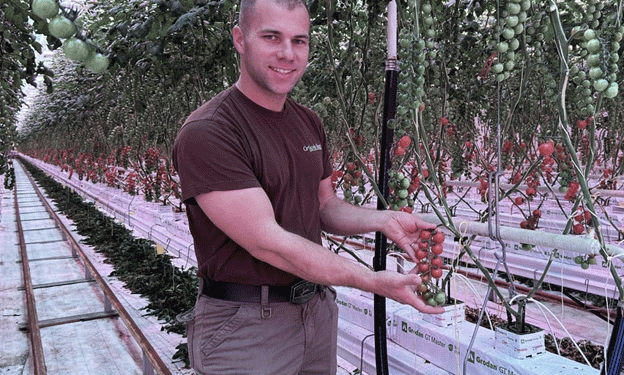Switzerland has long been dependent on tomato imports, especially during the cold winter months. However, Christian Bassi, a young and ambitious vegetable farmer from the Ticino region, has found a way to change that. With his state-of-the-art 5,000-square-meter greenhouse, Bassi is producing cherry tomatoes locally during the winter, offering a sustainable alternative to tomatoes imported from far-flung countries like Spain.
The greenhouse utilizes cutting-edge technology to create optimal growing conditions for the tomatoes. To mimic the sun’s essential light for photosynthesis, bright artificial lighting is used, ensuring that the tomatoes remain red and juicy even in the depths of winter. A computer-controlled system regulates temperature and airflow, maintaining a consistent environment for the plants—21°C during the day and 16°C at night. The energy for the LED lighting is sustainably sourced from a photovoltaic system on the greenhouse’s roof, while heat is supplied by the local waste-to-energy plant in Giubiasco, providing CO₂-neutral heating.
The tomatoes are grown using the “Hors-Sol” method, meaning they are cultivated without soil, making the system particularly environmentally friendly and resource-efficient. Despite being grown indoors, Bassi faces the challenge of pests, which are managed using beneficial insects—a natural solution that aligns with the greenhouse’s sustainability goals.
A Sustainable Alternative to Imported Winter Tomatoes
Bassi’s decision to grow winter tomatoes in Switzerland was motivated by his frustration with the reliance on imports. In Switzerland, tomatoes have traditionally been sourced from warmer countries like Spain, which enjoys ample sunshine but suffers from water scarcity. Bassi is convinced that local production is more sustainable in the long run, as it eliminates the need for long-distance transportation, which contributes to carbon emissions.
Vanessa Burg, an environmental engineer at ETH Zurich, has studied the ecological footprint of vegetable production and distribution. According to her, while the production of Swiss winter tomatoes is exemplary, especially with the use of district heating, tomatoes from Spain still have a lower environmental impact when considering only the production process. However, the significant water scarcity in Spain diminishes the ecological balance, making Swiss tomatoes the better option once transportation and other factors are taken into account.
Bassi’s tomatoes are significantly more expensive than their Spanish counterparts—up to four times the price—but they have found a strong market demand. They are sold in multiple Coop stores across Switzerland, and consumers appreciate the sustainable and local aspect of the product. Bassi hopes that his success will inspire other farmers to follow suit and start producing their own winter tomatoes.
The Future of Winter Tomato Production in Switzerland
Looking ahead, Bassi is not only focusing on expanding his production but is also planning to build a second greenhouse to double his winter tomato output by the next year. He is optimistic that the trend of locally grown winter tomatoes will catch on, and he encourages other Swiss farmers to explore high-tech solutions to increase local food production. His vision is to reduce Switzerland’s dependency on imports and help the country become more self-sufficient in agricultural production.
By investing in sustainable farming practices, Bassi is setting an example for a more eco-friendly and economically viable future for Swiss agriculture. His commitment to using renewable energy, efficient growing methods, and environmentally responsible pest control is a model for the future of farming in colder climates.
A Green Revolution in Swiss Tomato Farming
Christian Bassi’s innovative approach to growing winter tomatoes in Switzerland’s high-tech greenhouses is a testament to the future of sustainable agriculture. By utilizing advanced technologies like photovoltaic energy, CO₂-neutral heating, and integrated pest management, Bassi is not only making local tomato production possible during the winter but also contributing to a greener, more self-sufficient agricultural system. As demand for sustainable and locally grown produce continues to rise, Bassi’s work may pave the way for other Swiss farmers to follow in his footsteps.
The future of Swiss agriculture looks promising, with high-tech greenhouses offering a viable solution to challenges posed by climate and environmental sustainability. As Bassi continues to expand his business, the hope is that winter tomato production becomes a common practice across the country, helping Switzerland reduce its reliance on imported produce and ensuring fresh, locally grown tomatoes for consumers year-round.









